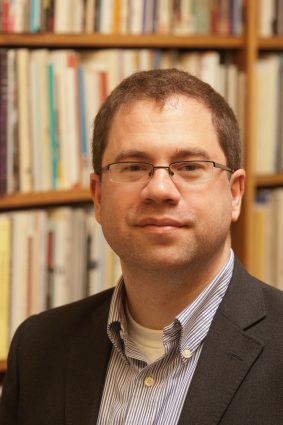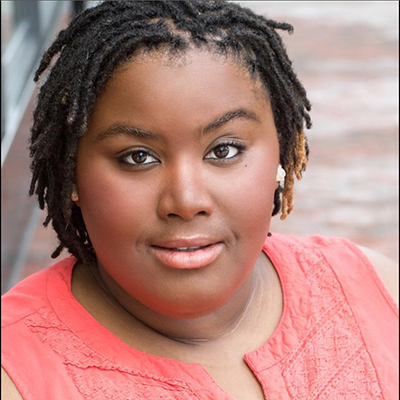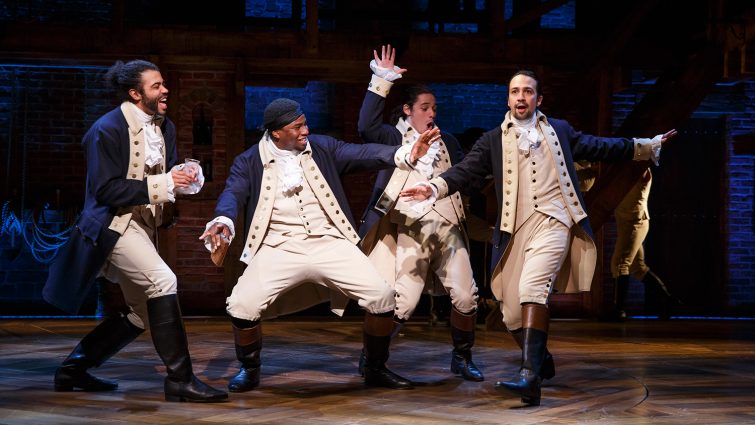How does a Cambridge-educated UMD professor
Come to Sandy Spring Museum to give a happy hour lecture?
Here’s a hint: Alexander Hamilton!
Richard Bell, an associate professor who joined the University of Maryland History Department in 2006, is a scholar, writer and teacher who focuses on the history and culture of the United States between 1750 and 1877. His latest book, “The Lost Boys: A Story of Slavery and Justice on the Reverse Underground Railroad,” will be published by Simon & Schuster in October. But on Friday, Jan. 10, Bell will be at the Sandy Spring Museum giving a talk that focuses on “Hamilton: An American Musical,” the musical theater phenomenon based on Revolutionary War hero Alexander Hamilton and the founding of the United States of America.

Bell was born in London, grew up in southwest England and went to Cambridge University, getting his bachelor of arts degree in history before heading to Harvard University for a master’s and doctorate in American history. He has been teaching at the University of Maryland, College Park since he graduated from Harvard in 2006.
“I’m an historian of early America,” he said. “I currently specialize in African American history, and the way the musical represents slaves and African Americans is one of several topics I want to talk about.”
With his presentation, “Hamilton: A Remix of History and Show Biz,” Bell will be talking about the way Lin-Manuel Miranda’s musical — which debuted in 2015 at Broadway’s Richard Rogers Theatre, won 11 Tony Awards and became part of the fabric of American culture — combines history and show business. And he will do this as part of the History Happy Hour series at the Sandy Spring Museum.
“We have had everyone from NPR journalists to authors to chefs to historians, and programs on local history,” explained Melanie Pinkert, folklife specialist at Sandy Spring Museum. “For example, last February, we had a really interesting program on the Finneyfrock business, which was a long-time, continuously operating business in Olney. We’ve also had programs on the Sharp Street Church, which is just down the street.”
Pinkert said that in addition to exploring local history, the museum likes to keep pace with current events — and it likes to provide a spot where the community can come together to celebrate art, culture and history. Pinkert noted that the museum offers a monthly teen coffee house and a monthly bluegrass jam, all part of its mission to “make meaningful connections to local history through cultural arts programming and to become a community-driven museum.”
History happy hours, where wine, beer and light refreshments are included in the admission fee, allow attendees to see the art exhibits, meet their neighbors and learn in a fun-filled atmosphere. “There always seems to be a core of ‘regulars,’” Pinkert said. “It’s a progressive audience; they like to engage in lively conversation with the presenters, and while attendance varies, we usually have a minimum of 20 to 40 people — but for timely topics, we have larger audiences than that.”

Which is why attendees for “Hamilton: A Remix of History and Show Biz” will need to secure tickets in advance. The evening will kick off with two songs from “Hamilton: An American Musical” sung by performing artist Jade Jones — recently seen at Olney Theatre in “Sweeney Todd” and “Anyone Can Whistle” — followed by Bell’s lecture and a Q&A session.
“Oftentimes, the program doesn’t end there because people are very enthusiastic, and they want to come up and talk more with the speaker,” added Pinkert. “Sometimes things go longer.”
Which is a good thing, because the affable Bell has a lot to talk about. “For all its many strengths, ‘Hamilton’ leans, perhaps, too easily, too quickly, on the mythological dimensions of the Founding Fathers,” he said. He is hoping to get his audience to take a closer look from a historical perspective.
“First of all: I love the show,” said Bell. “I think it’s a terrific piece of art and I hope everyone gets a chance to see it. It gets so many things right about the American past; it’s really impressive as a piece of mainstream Broadway theater.”
But, he added, “It also gets a few things not-quite-right, or actually wrong.”
As much as audiences have come to love the “young, scrappy and hungry” Caribbean immigrant, Alexander Hamilton was not a radical revolutionary ready to free the slaves along with his best friend John Laurens.
“Alexander Hamilton had slaves at various points in his life,” the professor pointed out. “He married into one of the richest slave-owning families in New York State, the Schuyler family. The Schuyler sisters themselves had 27 enslaved people helping them create the life of leisure that they enjoyed in New York City and elsewhere.”
Hamilton’s anti-slavery politics were pretty moderate, Bell said, as were those of even the non-Southern Founding Fathers. “He’s not really a very good fit for the role of anti-slavery freedom fighter.”
In fact, Bell said, the credit for pushing forward an agenda of universal freedom must go to the real revolutionaries: members of freed black communities who risked their own freedom to speak and act out against slavery. “Given how many enslaved people were in New York City in 1776 when the musical is set, and given the role that members of the freed black community had in getting others to safety and to freedom, it’s striking that in this musical, there are no black characters,” he exclaimed. “The two people who talk about slavery and wanting to fight it are Hamilton and John Laurens, two elite white men.”
Bell wants to imagine a musical wherein black characters are included and given a voice to “engage in dialogue, if not confrontation, with the white characters to produce a much more, I think, vibrant discussion about how to achieve the fight for freedom than the one we get onstage.”

That said, Bell’s talk will also focus on what “Hamilton: An American Musical” gets right — which is “lots and lots and lots!
“Let’s be clear about that,” Bell insisted. “The musical gets things overwhelmingly correct, though it takes a very narrow view of the freedom fight and the anti-slavery crusade.”
Its portrayal of Alexander Hamilton as an “up-from-his-bootstraps immigrant hero,” is accurate, according to Bell. “But once he was politically powerful, once he was in Washington’s cabinet and a man of means and substance in New York politics, I would argue that he devoted his life to distinctively elitist, anti-immigrant policies.”
He lays out his professorial arguments with elegance, but Bell know that the world loves “Hamilton.” “I don’t want to come across as a (jerk) who hates the show — I love the show!” he laughed. “I just want people to ask hard questions after they’ve seen it.
“I think the Founding Fathers were extraordinarily complicated people, and many of their choices don’t make sense to us in the 21st century,” he added. “Historians are interested in recovering complexity, in excavating national myth and hitting the hard ground underneath it.”
And Bell thinks “Hamilton” fans should try to do the same. “I just encourage us to read, to study, to think, to ask questions,” he said. “To enjoy the show as a great piece of Broadway entertainment, and if it leaves you with questions about the real Founding Fathers, to go out to your library and find books written by scholars that can help you understand.”
Or to Sandy Spring Museum, for History Happy Hour.
“Hamilton: A Remix of History and Show Biz,” part of the History Happy Hour series at the Sandy Spring Museum, 17901 Bentley Road, Sandy Spring, takes place from 6:30 to 8 p.m. on Friday, Jan. 18. Admission is $20, and advance ticket sales end at 5 p.m. on Jan. 18. Call 301-744-0022 or visit www.sandyspringmuseum.org.